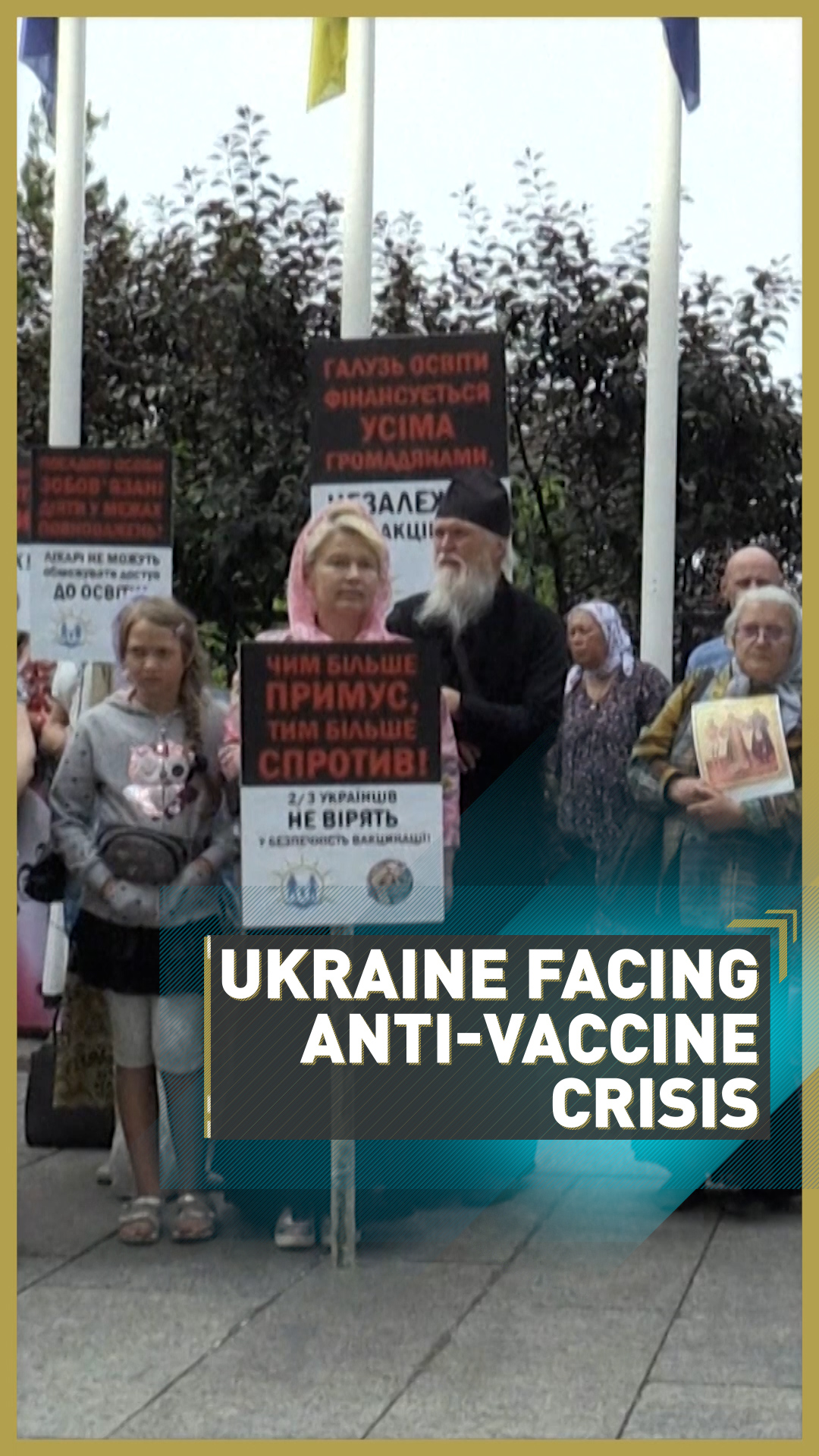02:39

As countries race to vaccinate their populations against COVID-19, Ukraine is yet to administer a single dose and won't receive delivery of its first batch of jabs until later this month.
Even when the vaccines arrive, its government faces another pressing question: How many people will be willing to take the vaccine?
A survey conducted by the Wellcome Trust in 2019 revealed that just 29 percent of Ukrainians think vaccines are safe and only 50 percent believe they are effective.
More worryingly, research by UNICEF, the charity tasked with educating the country about inoculations, has found that 40 percent of healthcare workers are also skeptical about vaccines. A significant number haven't even been trained to give vaccinations.
Research has proven that vaccines protect humans against disease, but Ukraine's distrust of jabs goes back several decades.
Lotta Sylwander, UNICEF's representative in Ukraine, told CGTN: "I think at the base of it all is an old inherited distrust for the public health system from Soviet times, where people didn't feel that they were actually cared for by the health system.

UNICEF research suggests that 40% of Ukraine's healthcare workers are skeptical about vaccines. /AFP
UNICEF research suggests that 40% of Ukraine's healthcare workers are skeptical about vaccines. /AFP
"They felt that the drugs that they were getting were not necessarily effective and sometimes I think there was a lot of suspicion that they were given either experimental things or sugar pills. It's the same with vaccinations."
These concerns are even shared by healthcare professionals. "We have found that about 40 percent of health workers are vaccine hesitant," Sylwander added.
"They are the ones who should know. They're the ones who should be doing this. They are the ones who should be the champions of the good examples for the rest of the population."

In 2019 more than 57,000 people in Ukraine contracted measles. In an attempt to stop the outbreak, the government threatened to ban unvaccinated children from school but were met with resistance from anti-vaccine protestors. /AFP
In 2019 more than 57,000 people in Ukraine contracted measles. In an attempt to stop the outbreak, the government threatened to ban unvaccinated children from school but were met with resistance from anti-vaccine protestors. /AFP
Distrust has resulted in low uptake of vaccinations for several serious diseases. In 2019, over 57,000 Ukrainians were infected with measles, a disease that has been eradicated from most European countries since 2002. Cases of polio and diphtheria have also been recorded.
In an attempt to control the outbreak and encourage people to come forward for measles vaccinations, the government threatened to ban children from being allowed into schools if they hadn't been vaccinated. That threat resulted in an anti-vaccination protest in Kiev.
A child may become disabled after the vaccine. I would blame myself all my life
- Anti-vaccine protestor Anzhelika Sobchenko, who wrongly fears vaccines can cause autism in children
Some are clearly influenced by debunked claims of a link with autism. Anzhelika Sobchenko, an anti-vaccine protester speaking at the time of the protest, told AFP: "When you go to get vaccinated, you take responsibility and this is very risky because there may be problems... A child may become disabled after the vaccine."
UNICEF has now started a mass drive to educate the country about the benefits of vaccines but in doing so they have also uncovered another major problem: many of the country's doctors and nurses haven't been trained to give vaccinations.
UNICEF is trying to change that: "As we're speaking now, we're also training thousands and thousands of health workers around the country to be able to, first of all, give the Pfizer vaccine and then to be able to continue with the AstraZeneca, the Novavax or whatever it is that's going to come into the country," added Sylwander.
Ukraine has secured 12 million doses of the COVID-19 vaccines developed by AstraZeneca and Novavax. It is also awaiting delivery of a further eight million doses from the United Nations' COVAX scheme and up to five million of China's CoronaVac jab.

Data from the European Center for Disease Prevention and Control highlights the scale of the measles outbreak in Ukraine in 2019 as a result of large numbers of people not being vaccinated against the disease. /CGTN
Data from the European Center for Disease Prevention and Control highlights the scale of the measles outbreak in Ukraine in 2019 as a result of large numbers of people not being vaccinated against the disease. /CGTN
In the meantime, the World Health Organization (WHO) has been helping the country to prepare for its vaccination program. The WHO told CGTN it has completed Ukraine's preparation for the "first wave of vaccination response to vaccinate medical professionals who are providing services to patients with COVID-19."
Co-ordination and micro-planning workshops have also been completed with organizers in 11 regions, with the country's remaining 13 regions to undergo the same workshops by February 15. An additional 50 mobile vaccination teams will soon undergo training across the country.
As preparations gather speed, Ukraine's trust in vaccines also needs to grow apace.
Video editor: Natalia Luz | Video producer: Alec Fenn
Source(s): AFP

